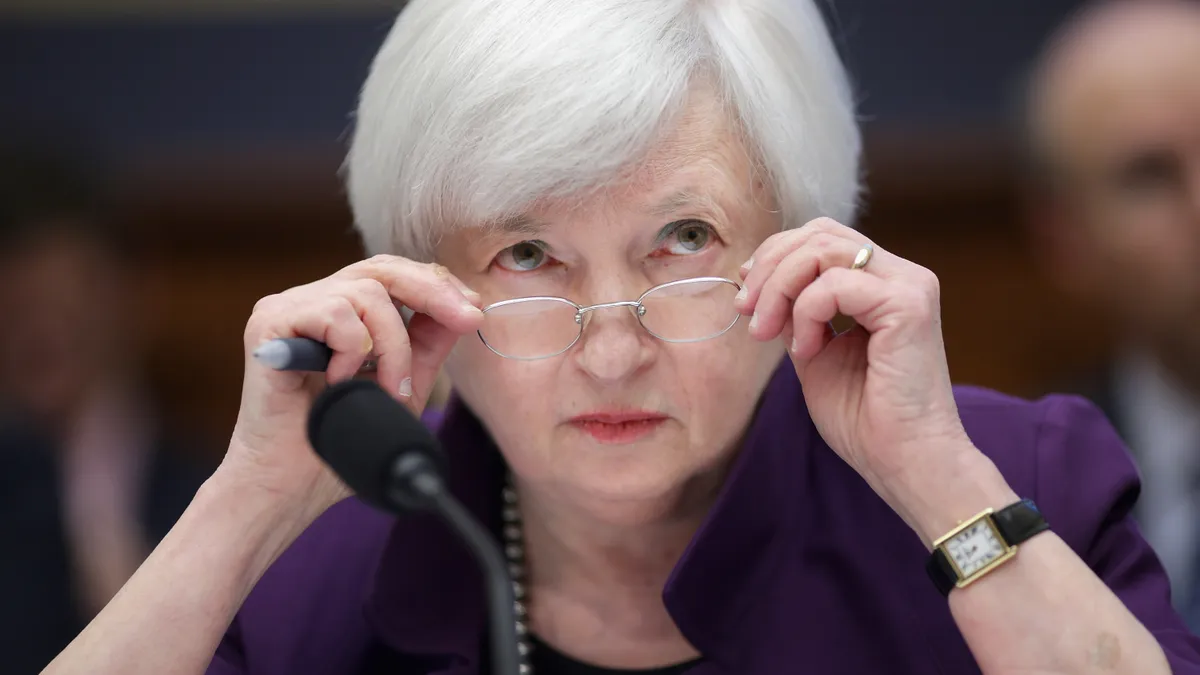Dive Brief:
- More oversight of the fintech sector and bank-fintech partnerships is needed to protect consumers and enable sustainable competition in the financial services industry, the Treasury Department said in a report released Wednesday.
- While a growing number of fintechs are providing consumers with innovative services, they are also creating new risks, the Treasury said, highlighting data privacy and regulatory arbitrage as examples.
- The Treasury’s report follows last year’s White House executive order aimed at promoting competition in the U.S. economy and comes as the Office of the Comptroller of the Currency (OCC) has signaled plans to step up scrutiny of bank-fintech relationships.
Dive Insight:
Nonbanks, particularly fintechs, are rebundling core banking services outside the bank regulatory perimeter and contributing to competitive pressure in the banking industry, the Treasury Department said in its 122-page report.
“Innovation and competition must work hand in hand in a healthy economy,” Treasury Secretary Janet Yellen said in a statement Wednesday. “While non-bank firms’ entrance into core consumer finance markets has increased competition and innovation, it has not come without additional risks to consumer protection and market integrity.”
The Treasury’s report lays out actions that would maintain fair, transparent and competitive markets while encouraging responsible innovation that benefits consumers, Yellen said.
“With existing authorities, regulators can encourage competition and innovation while further safeguarding and protecting consumers,” she said.
The agency highlighted the growth of the fintech sector in the years following the 2007-08 financial crisis.
More than 1,200 fintech firms formed in the decade following the crisis and focused on consumer deposits, lending and payments, according to the Treasury.
“In the mortgage market, fintech and other non-bank originations rose from approximately 30% of the market in 2007 to 50% by 2015,” the agency said. “Additionally, fintech funding has grown, with an average of 1,200 general fintech funding deals completed each year between 2015 and 2021.”
While fintechs have managed to fill gaps in the traditional finance market, new uses of data and artificial intelligence present data privacy risks and the potential for new forms of surveillance and discrimination, the department said.
“New entrant non-bank firms may be able to continue to help improve core consumer finance markets, but to do so sustainably, further steps must be taken to monitor and address risks to consumers, market integrity, and safety and soundness,” the agency said in the report.
The agency also warned about the “intermingling of commerce and banking.” As bank-fintech partnerships become more intertwined, there is a risk of competition asymmetries and concentration of market power, the agency said.
To address bank-fintech risks, the Treasury Department recommends regulators provide a clear and consistently applied supervisory framework for bank-fintech relationships.
“A bank-fintech relationship that delivers consumer financial services provided by an insured depository institution (IDI) must operate in compliance with the laws, regulations, and risk management standards applicable to the IDI,” the agency said.
Regulators should also boost supervision of bank-fintech lending relationships to ensure they comply with consumer protection laws and their impact on consumers’ financial well-being, the department said.
One bank regulator has already indicated it is taking a closer look at the fintech space and its ties to the banking industry.
OCC Acting Comptroller Michael Hsu called out the complex nature of bank-fintech partnerships in a speech in September, saying the ventures could put the financial system at risk of a crisis if not properly supervised.
And in an effort to bolster the agency’s fintech expertise, the regulator announced plans to launch a fintech office next year.













